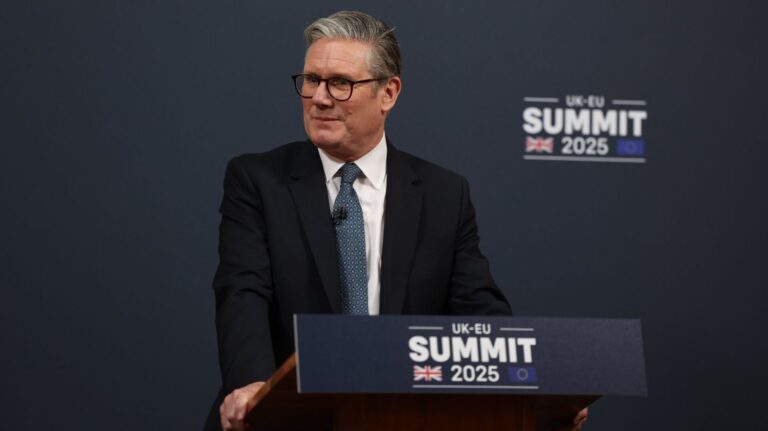A new deal establishing post-Brexit relations between the UK and the EU has today [19 May 2025] been announced. The deal covers matters such as fishing, agricultural exports and defence.
10 Downing Street issued a statement confirming that an agreement between the UK and the EU had been made, as a result of ‘extensive negotiations over the last six months’. This announcement follows another two international trade deals announced by the UK in recent weeks: the first with India, and the second with the US.
UK prime minister Sir Keir Starmer described the deal as “good for jobs, good for bills, and good for our borders”.
The UK government claims that a new sanitary and phytosanitary measures (SPS) agreement included in the deal will ‘make it easier for food and drink to be imported and exported by reducing the red tape that placed burdens on businesses and led to lengthy lorry queues at the border’.
Additionally, it was announced that ‘some routine checks on animal and plant products will be removed completely, allowing goods to flow freely again, including between Great Britain and Northern Ireland’. This, the government says, could ‘lower food prices and increase choice on supermarket shelves’.
Furthermore, British steel exports are due to be protected from new EU rules and tariffs, through a ‘bespoke arrangement’ for the UK that the government claims will save UK steel £25 million per year.
Other matters negotiated in the deal include access to more EU e-passport gates for British holidaymakers, a formal UK-EU defence and security pact, and the avoidance of the EU’s carbon tax – due to come into effect next year.
Leader of the opposition, Conservative leader Kemi Badenoch MP, was quick to criticise the deal, saying she was “gobsmacked” by the announcement and describing it as a “sell-out, especially on fishing”.
She expressed concerns over the length of time until the next scheduled negotiation on fishing terms, as well as the linking of the UK and the EU’s respective Emissions Trading Systems. This is something the government says ‘will improve the UK’s energy security and avoid businesses being hit by the EU’s carbon tax due to come in next year’, but Badenoch warns that it could lead to “higher energy bills”.
“We should be using the opportunities of leaving the EU, not taking step backwards,” she concluded.
Business group Logistics UK’s head of trade and devolved policy, Nichola Mallon, responded to the news of the deal by saying: “The new deal has the potential to drive growth throughout the UK by boosting Great British agrifood trade to Northern Ireland, and between Great Britain and the EU, through reduced bureaucracy, costs and border delays.
“While the technical details have yet to be agreed, our members will welcome the deal in principle. It is now vital that the technical discussions and implementation, shaped by the input of businesses which have the expertise, are completed as a matter of urgency, so that UK traders and logistics businesses can realise the benefits of trading under the revised terms.
“The current requirement for SPS checks on plant and animal products moving between Great Britain and the EU, and vice versa, is adding time, bureaucracy and cost to UK traders and logistics operators. It is a burden that is hard to manage for SMEs and groupage operators in particular, as they must pay fees on each of the smaller shipments that they combine together.
“Since the UK’s decision to leave the EU was announced, Logistics UK has been consistent in calling for a comprehensive SPS agreement between both economies. We have been making the case robustly to government and we are delighted at this commitment to a joint agreement that should smooth the passage of agrifood and plant products into and out of the country while protecting the UK’s biosecurity.”
The deal has also been welcomed by the Port of Dover, which said in a statement that it “represents a significant and positive step forward in resetting and strengthening our vital cross-Channel economic relationship”.
Handling approximately one third of all UK-EU goods trade, the port’s statement said that it particularly welcomes “commitments to simplifying trading and travel arrangements and removing barriers such as SPS checks on animal and plant products, which [it hopes] to see implemented as quickly as possible”.
Interested in sustainability in supply chains? Come along to Logistics Manager’s Sustainable Supply Chain Conference, returning to 30 Euston Square in London on 24 June 2025.
The conference is a one-day face-to-face event where delegates can hear directly from industry-leading speakers about how business sustainability can influence their bottom line.
Amongst the list of speakers already announced for the conference are representatives of organisations such as NHS England, Bidfood, Haleon and OLPRO, as well as sponsors of the conference Descartes, Wincanton, Springpack, Mer Fleet Services and Aurora Insights.
Click here to find out more and register for this unmissable event!







